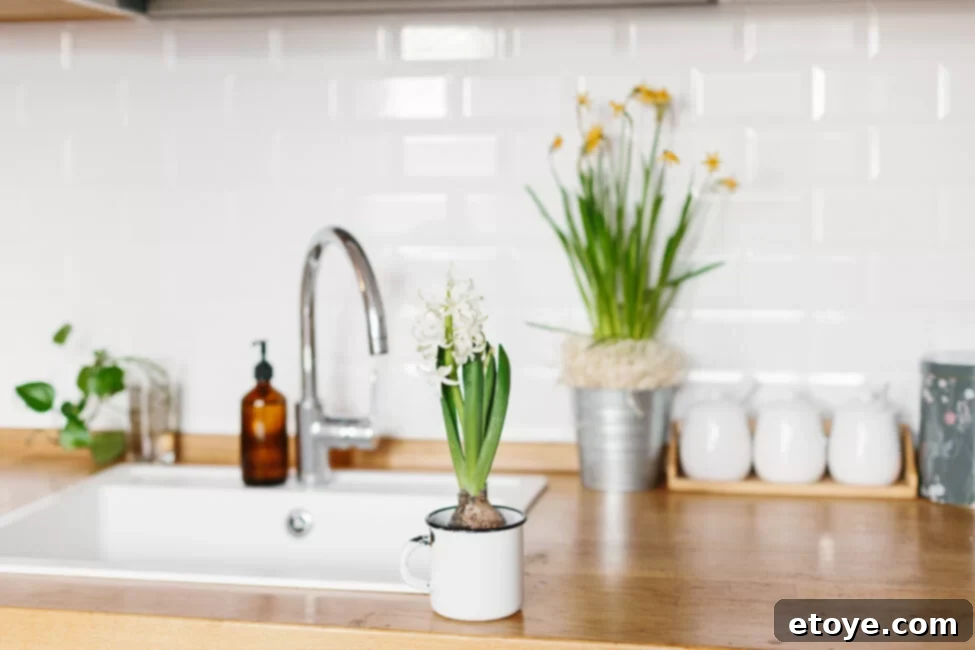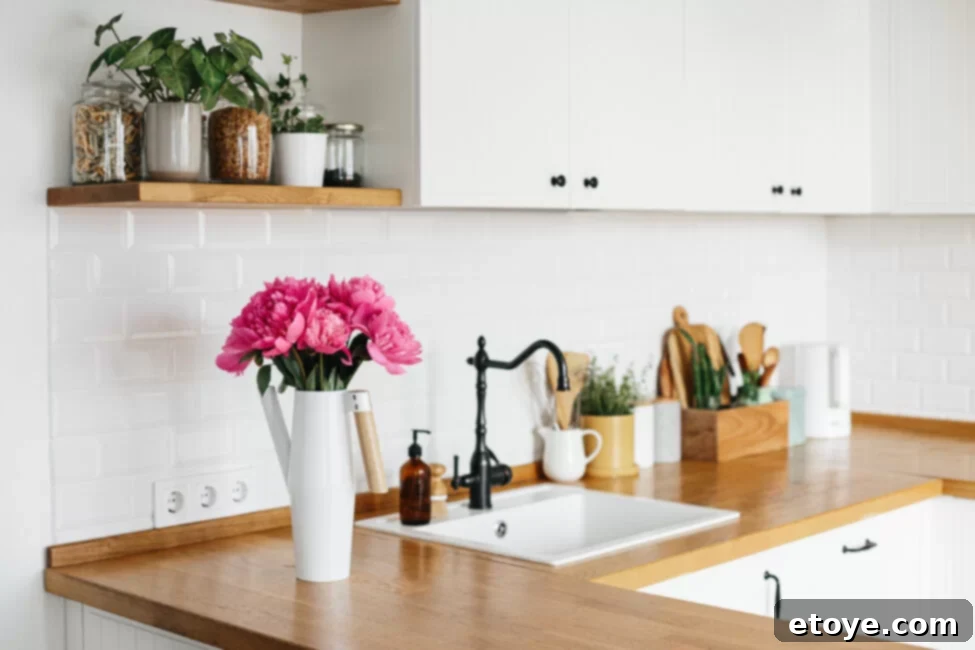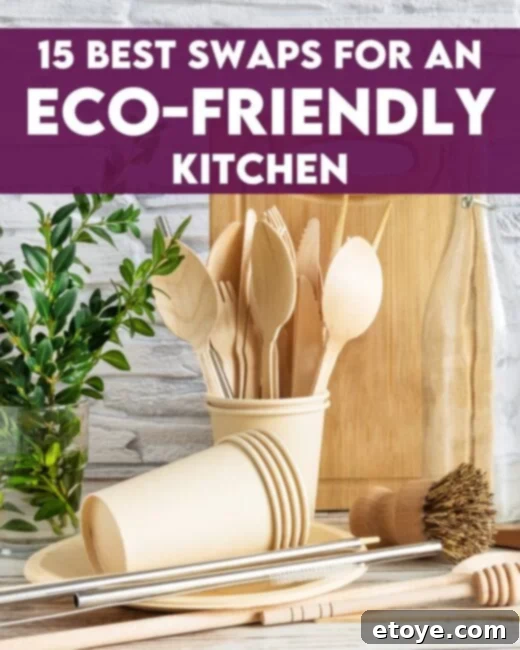As a seasoned TV chef, passionate cookbook author, dedicated recipe developer, and, most importantly, an enthusiastic home cook for many years, I’ve had the privilege of experiencing a vast array of kitchen products. Over time, a pressing question began to weigh heavily on my mind: how much of what I use in my daily kitchen routine contributes to the staggering volume of waste generated in America? This thought, deeply rooted in environmental concern, is a sentiment I believe many of you share. If you’ve found yourself gazing at your kitchen, pondering how to infuse it with an eco-friendlier spirit without committing to an off-grid lifestyle, then you’re exactly where you need to be.
The journey towards a more sustainable kitchen doesn’t have to be daunting or radical. In fact, it’s often about making simple, practical swaps that collectively create a significant positive impact on our planet. We’re on this path together, and I’m thrilled to share some of the easiest yet most effective changes each of us can embrace to transform our cooking spaces into planet-friendly havens. It’s truly less complicated than you might imagine!
Below, you’ll discover 15 of my top eco-friendly recommendations designed to help you cultivate a more sustainable kitchen, reduce your environmental footprint, and potentially save some money along the way. Get ready to upgrade your kitchen game for the good of the Earth and your peace of mind.

1. Ditch Plastic Wrap for Sustainable Bee’s Wrap
Plastic wrap has long been an indispensable kitchen staple, seemingly vanishing faster than New Year’s resolutions. Yet, its convenience comes at a significant environmental cost, contributing to landfills and marine pollution. The perfect, sustainable antidote? Beeswax wrap! This innovative product is not only reusable and washable but also incredibly charming. Crafted from organic cotton infused with a blend of beeswax, tree resin, and nourishing essential oils, it offers a natural, breathable alternative for food preservation. Beeswax wrap creates a protective, airtight seal that keeps your food fresh while allowing it to breathe, preventing sogginess. Best of all, it’s entirely biodegradable and compostable at the end of its long life, ensuring it returns cleanly to the earth, giving you a clear conscience with every use. Say goodbye to single-use plastics and embrace this eco-chic solution for a truly sustainable kitchen.
2. Replace Paper Towels with Absorbent Swedish Dishcloths
The allure of paper towels for quick clean-ups is undeniable, but their single-use nature generates immense waste and contributes to deforestation. It’s time for an upgrade that’s both effective and environmentally responsible: Swedish dishcloths. These remarkable “super-absorbers” are made from a blend of cellulose and cotton, allowing them to soak up spills far more efficiently than traditional paper towels—often holding up to 20 times their weight in liquid. Unlike paper, Swedish dishcloths are designed for repeated use; simply wash them by hand or in the washing machine, and they’re ready for action again. They dry quickly, which helps prevent bacterial growth, and can last for months, if not a year, replacing dozens of rolls of paper towels. Plus, they come in an array of delightful designs, adding a touch of Scandinavian flair to your kitchen while significantly reducing your carbon footprint and saving you money over time.
3. Transition from Plastic Containers to Durable Glass
Remember the era when plastic Tupperware reigned supreme? While convenient at the time, we now understand the potential health and environmental drawbacks associated with plastics, especially when exposed to heat. It’s time to move forward with glass containers, the undisputed champion for safe and sustainable food storage. Glass offers a non-porous, non-reactive surface that won’t leach harmful chemicals into your food, even when microwaved or heated. These containers are incredibly durable, resisting stains and odors, and designed for endless reuse. They transition seamlessly from freezer to oven to table, making meal prep and storage a breeze. Beyond their practical benefits, glass containers provide a clear, elegant aesthetic that instantly elevates the organization and appearance of your fridge and pantry, giving your kitchen a sophisticated, catalog-worthy look.
4. Choose Reusable or Compostable Straws Over Plastic
Plastic straws, though seemingly small and insignificant, pose an enormous threat to our oceans and marine wildlife, often ending up polluting delicate ecosystems. Fortunately, replacing them is incredibly simple, offering two excellent eco-conscious options. First, consider reusable straws, available in durable stainless steel, elegant glass, or natural bamboo. These options are built to last, easy to clean with a dedicated brush, and convenient to carry with you for on-the-go drinks. For those seeking maximum convenience without the commitment of cleaning and carrying, compostable straws are a fantastic alternative. Crafted from natural, plant-based materials like cornstarch or agave, they break down easily in a compost bin, minimizing environmental impact. While reusable options offer greater long-term cost savings, both choices contribute positively to your environmental karma, demonstrating a tangible commitment to reducing plastic waste and protecting our planet.
5. Embrace Reusable Totes for Grocery Shopping
Many of us have fallen into the habit of accumulating single-use plastic grocery bags, intending to reuse them, only to find ourselves overwhelmed by their sheer volume. This common struggle highlights a systemic problem: the environmental burden of disposable bags. The good news is there’s a far superior and undeniably stylish solution: reusable shopping bags. Available in a diverse range of sustainable materials such as sturdy hemp, natural jute, organic cotton, or innovative recycled PET, these totes are designed for durability and repeated use. By opting for reusable bags, you significantly reduce your reliance on single-use plastics, preventing countless bags from ending up in landfills or polluting natural environments. Moreover, reusable bags are often stronger and more spacious, making your trips to the grocery store more efficient and even earning you a nod of approval from your cashier.
6. Swap Plastic Bottles for Elegant Reusable Water Bottles
Here’s one of the easiest and most impactful eco-swaps you can make: eliminate single-use plastic water bottles from your life and invest in a high-quality reusable water bottle (or a few!). The environmental cost of bottled water, from production to disposal, is immense. Reusable bottles, on the other hand, offer a sustainable and often superior alternative. You’ll find a wide variety of designs and materials, including insulated stainless steel that keeps liquids cold for hours (or hot beverages warm) far more effectively than any plastic bottle. Glass and durable Tritan plastic options are also popular. Many sustainable brands now integrate clever features like built-in filters, fruit infusers, and ergonomic designs, making hydration a pleasure. Beyond the significant environmental benefit of reducing plastic waste, a stylish reusable bottle can become a personal accessory, making it the more appealing and responsible choice for both you and the planet.
7. Choose Plant-Based Sponges Over Synthetic Varieties
Did you know that conventional dish sponges are typically made from petroleum-derived synthetic materials like plastic, which shed microplastics and are not biodegradable? Considering how frequently they need to be replaced due to wear and bacterial build-up, this contributes to a significant waste problem. It’s time to make a greener switch with plant-based sponges. Crafted from natural, renewable resources such as highly absorbent cellulose, fibrous loofah, or robust coconut fibers, these sponges offer powerful cleaning performance without the environmental guilt. All these materials are biodegradable, and many are even compostable, ensuring they return to the earth without leaving a lasting footprint. This small but mighty change in your cleaning routine can make a substantial difference in reducing household waste and supporting a healthier planet.
8. Opt for Hygienic Eco-Friendly Dish Brushes
If you’re looking to move beyond sponges entirely, perhaps due to concerns about bacteria accumulation, eco-friendly dish brushes are an exceptional alternative. Designed with sustainability and hygiene in mind, these brushes typically feature durable bamboo handles and natural bristles made from materials like sisal or coconut fibers. Unlike sponges, brushes dry more quickly and provide better airflow, significantly reducing the likelihood of harboring bacteria. Many designs boast replaceable heads, meaning you only discard the bristle portion when worn out, rather than the entire tool, further minimizing waste. Beyond their practical benefits, these well-crafted brushes exude a natural, sophisticated aesthetic that instantly upgrades your sink area, offering a far more elegant and hygienic solution than a tired, worn-out sponge.
9. Replace Disposable Baggies with Reusable Silicone Bags
Pause for a moment and consider the sheer number of single-use plastic sandwich and freezer bags that pass through your kitchen each month. Not only are these disposable bags a persistent source of plastic waste, but their recurring purchase can also add up, effectively throwing away your hard-earned money. The superior, sustainable solution is reusable silicone bags. These incredibly versatile bags can handle anything traditional plastic bags can—and more. They are freezer-safe, microwave-safe, oven-safe, and dishwasher-safe, making them ideal for everything from marinating meats and storing leftovers to packing lunches and road trip snacks. Available in a variety of sizes and vibrant colors, they’re leak-proof, incredibly durable, and will withstand countless uses. Once you experience the convenience and sustainability of silicone bags, you’ll wonder how you ever managed with their disposable counterparts.
10. Invest in Non-Toxic, Long-Lasting Cast Iron Cookware
Many have sought alternatives to traditional non-stick Teflon, opting for ceramic options, only to find their lifespan disappointingly short—often just 1-2 years before losing their non-stick properties and needing replacement. Your next pan should be your last, and that’s where cast iron cookware shines. It’s the undisputed MVP of eco-friendly kitchens and one of the most sustainable and enduring products you can add to your culinary arsenal. Cast iron is renowned for its incredible durability, often lasting for decades, even generations, becoming a treasured family heirloom. This longevity dramatically reduces waste destined for landfills. Crucially, cast iron contains none of the toxic chemicals found in many non-stick coatings. As an added benefit, cooking with cast iron can subtly infuse your food with dietary iron, which is beneficial for health, and its excellent heat retention means you often need less oil, leading to further savings. What are you waiting for? Embrace the timeless appeal and unparalleled performance of cast iron.
11. Swap Paper Coffee Cups for Stylish Reusable Coffee Cups
For many, the day simply doesn’t begin until that first glorious sip of coffee. If you’re a daily coffee drinker, the sheer volume of single-use paper and plastic cups that contribute to landfill waste is a concerning thought. A reusable coffee cup is not just a sustainable choice; it’s a profound, yet simple, daily commitment to the planet. Beyond its environmental benefits, a reusable cup allows you to express your personal style with an array of aesthetic and functional designs, rather than being a walking advertisement for a coffee chain. Furthermore, many coffee shops incentivize sustainability by offering discounts to customers who bring their own cups, adding a financial perk to your eco-conscious choice. Crafted from durable and sustainable materials like stainless steel, glass, or bamboo, a reusable coffee cup ensures you can enjoy your morning brew guilt-free, knowing you’re making a positive impact.
12. Transition to Eco-Friendly Cleaning Products
The decision to switch to eco-friendly cleaning products is an easy one for multiple reasons. Firstly, the planet is burdened by the persistent use and disposal of harsh chemical cleaners, which can pollute waterways and harm ecosystems. Secondly, your health and the well-being of your loved ones are directly impacted by exposure to toxic fumes and residues from conventional cleaning agents. Eco-friendly alternatives are formulated with natural, biodegradable ingredients that effectively clean your home without posing risks. Many sustainable brands also go a step further by offering their products in reusable or recyclable packaging, or as concentrated solutions that you can dilute at home, significantly reducing plastic waste and saving you money. An undeniable bonus? The natural essential oils often used in these products leave your kitchen smelling wonderfully fresh and inviting, free from harsh chemical odors.
13. Upgrade to Durable and Safe Bamboo Kitchen Utensils
While nylon and silicone utensils certainly have their place in the kitchen, bamboo utensils offer a compellingly sustainable and highly functional alternative. Bamboo is an extraordinary resource; it’s one of the fastest-growing plants on Earth, making it incredibly renewable and environmentally friendly. Beyond its sustainability, bamboo naturally boasts impressive antibacterial properties, contributing to a more hygienic kitchen. Unlike metal utensils, bamboo is gentle on your pots and pans, preventing scratches on non-stick surfaces and prolonging the life of your cookware. Lightweight, strong, and naturally biodegradable, bamboo utensils are a smart, stylish, and sustainable choice that will serve you well for years, and when their time comes, they’ll return to the earth without a trace.
14. Discover the Versatility of Silicone Baking Mats
For baking enthusiasts and home cooks alike, the continuous use of parchment paper and aluminum foil creates a steady stream of kitchen waste and recurring expenses. Enter silicone baking mats, your new best friend for a zero-waste kitchen. These incredibly durable, non-stick mats are designed for endless reuse, effectively replacing countless rolls of disposable paper and foil. Their utility extends far beyond just baking cookies; they are perfect for roasting vegetables, crisping up pizzas, or even searing meats in the oven, as they are safely oven-resistant. Easy to clean with just soap and water (or in the dishwasher), and perfectly sized to fit standard baking sheets, silicone mats offer a seamless, waste-free, and cost-effective solution for all your culinary endeavors. It’s a simple swap that delivers significant environmental and financial benefits.
15. Opt for Reusable Coffee Filters for Your Daily Brew
For the dedicated daily coffee drinker, the cumulative waste from disposable paper coffee filters can be a quiet source of concern. However, there’s an incredibly simple and effective solution: reusable coffee filters. Brands like CoffeeSock, for instance, offer high-quality reusable filters made from easy-to-wash organic cotton fabric. These filters are designed to last for at least a year, sometimes even longer, meaning you could drastically reduce your filter purchases to just once a year. Imagine the substantial reduction in waste and the convenience of always having a filter on hand! Switching to a reusable coffee filter is an effortless yet profoundly impactful way to make your morning routine more environmentally savvy, saving resources and lessening your ecological footprint with every delicious cup.

Are You Ready To Cultivate a Sustainable Kitchen?
Considering the sheer volume of single-use items that flow in and out of our kitchens, adopting these planet-friendly alternatives represents a powerful and accessible starting point on our collective journey toward a more sustainable lifestyle. Integrating eco-friendly kitchen products into your daily routine is one of the most effective ways to make a tangible difference, benefiting not only the planet but also your personal well-being and your wallet. These simple swaps empower you to reduce waste, conserve resources, and embrace a healthier way of living without sacrificing convenience or style. Every conscious choice, no matter how small, contributes to a larger, more impactful movement towards a greener future.
Have you already embraced any of these sustainable kitchen swaps? Do you have other fantastic recommendations for making a kitchen more eco-friendly? We are eager to hear your insights and experiences! Please share your thoughts and tips in the comments section below to inspire fellow readers on their sustainability journey.
Looking for More Kitchen Tips?
- 5 Kitchen Tips To Save Money & Reduce Food Waste
- 20 Kitchen Organization Ideas For Pots And Pans
- Reverse Meal Planning
- 10 Best Tips On How To Grow An Indoor Herb Garden
